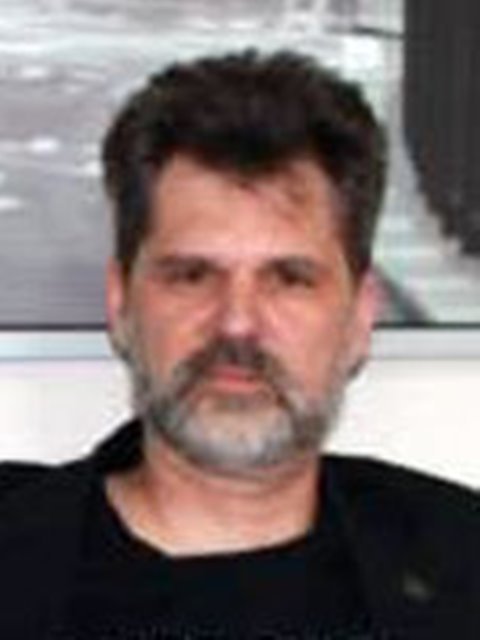Turkish Army's waiting game: The siege of Kobani
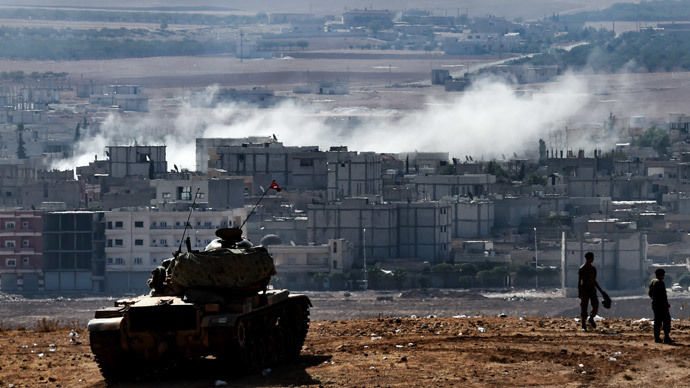
Syria's war, which erupted as an orchestrated armed insurrection against the Assad regime, is a long-standing thorn in the side of the US. But lately it has taken a backseat with the emergence of Jihadi or "Al-Qaeda-linked" opposition groups.
From fighting to Assad to battling the Islamic State
Last year, Jabhat al-Nusra (or the al-Nusra Front) was the most talked-about and dangerous Jihadi faction - the well-informed Middle East watcher Robin Wright then said that al-Nusra was "the best-disciplined of the rebels' many disjointed factions.” A lot has changed since then, and now Wright calls the terror group now known as Islamic State (IS), "the most aggressive and ambitious extremist movement in the world.” IS emerged on the scene with a big bang last June when the Jihadi outfit began its offensive across northern Iraq and in the process merged these newly conquered oil-rich regions with their territories held in Syria, proclaiming them to constitute the Geo-Body (using Thongchai Winichakul's 1997 coinage) of the new Islamic Caliphate led by Abu Bakr al-Baghdadi who duly assumed the title of Caliph Ibrahim (29 June). After seizing the city of Mosul on 10 June and subsequently continuing their rampage throughout Iraq, the Caliph's forces set out to consolidate and expand these gains - the self-proclaimed Islamic State or Caliphate now commands vast swaths stretching from Aleppo in northern Syria to the province of Diyala in eastern Iraq and even threatening the Iraqi capital of Baghdad. The IS imposes its own strict interpretation of Islam on the local population, forcing many to flee for nearby areas and committing huge numbers of human rights' abuses in the process.
Amnesty International published in September a sobering report saying that the IS “carried out ethnic cleansing on a historic scale” in northern Iraq. According to the human rights group, the IS has systematically targeted non-Arab and non-Sunni Muslim communities, killing or abducting hundreds, possibly thousands, and forcing more than 830,000 others to flee the areas it has captured since 10 June 2014. Ethnic and religious minorities – Assyrian Christians, Turkmen Shi’a, Shabak Shi’a, Yazidis, Kakai and Sabean Mandaeans – have lived together in the Nineveh province; much of it now under IS control, for centuries. Today, only those who were unable to flee remain trapped there, under threat of death if they do not convert to Islam, the report stated. “Hundreds, possibly thousands, of Yazidis, most of them women and children from the Sinjar region, were abducted as they fled the IS takeover in early August," the document read. And, elaborating on the difficulties faced by the minority, the report adds that "Yazidi fighters and some civilians have been sheltering" on Mount Sinjar since 3 August, and these refugees were surrounded by IS fighters.
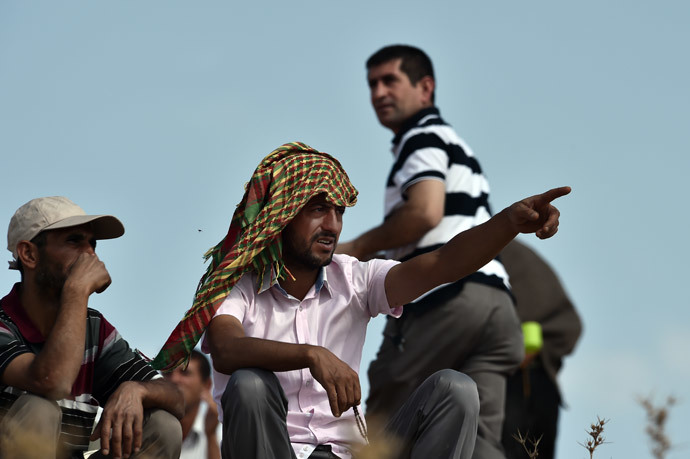
The plight of these Yazidis forced the hand of US President Obama, who on 7 August authorized air strikes in aid of the refugees trapped on Mount Sinjar. He ordered American air force to support the Kurdish Peshmerga (armed forces of the Kurdish Regional government or KRG in Northern Iraq) battling in the north of the country and even authorized strikes in the vicinity of Baghdad. And subsequently, the US President was not shy in calling the US military mission to rescue the trapped Yazidis a ringing success.
AKP, PKK, PYD, and IS
But since then, the Caliph has set his eyes on other goals and regions: namely on the "area in the north-east of Syria and just south of Turkish territories , which is a multi-ethnic mosaic with a Kurdish majority, and the PYD (or the Kurdish Democratic Union Party) had established an autonomous region called Rojava, meaning the West or sunset in Kurdish, as it corresponds to the westernmost regions occupied by Kurds spread out across Syria, Turkey, Iraq, and Iran". And on 16 September the "Islamic State attacked the region, leading to the exodus of numerous frightened Kurds across the border into Turkey", by means of commencing the siege of the city of Ayn al-Arab, known as Kobani in Kurdish. In the Turkish media these refugees are mostly described as Syrians, avoiding any mention of the name Kurd all together, indicates how sensitive the whole situation has become for the ruling AKP. The Turkish state has been fighting the terrorist PKK (Kurdistan Workers' Party) for decades now, and Erdogan's government initiated a peace process with Turkey's Kurds, who constitute about 18 percent of the country's population corresponding to approximately 13 million individuals, some years ago - a process that could now very well be in jeopardy due to the IS advance and the influx of Rojava refugees.
And even though the world's attention now appears gripped by the 400 Kurdish fighters who have so far died defending the city and the 200,000 Kurdish civilians that have crossed the border into Turkey; it bears repeating that some 4,500 Yazidis still remain captives of the Islamic State.
The Turkish Connection
Turkey, as "NATO's most eastern member and the Islamic world's gateway to the West", has been directly involved in the neighboring conflict since the very beginning. Over the past years Turkey's leadership has been very vocal in its condemnation of the Assad regime next door, in spite of having previously entertained friendly relations with Damascus. Some time ago I detailed Turkey's apparent complicity in the outbreak of violence across its southern borders. And now, out of the blue as it were, the US Vice President Joe Biden publicly acknowledged the role played by Turkey, as well as those of the UAE, Qatar, and Saudi Arabia.
Speaking at the John F. Kennedy Jr. Forum at the Institute of Politics at Harvard University on October 2, Biden said “our allies in the region were our largest problem in Syria,” elaborating that Turkey, Saudi Arabia and the UAE were “so determined to take down Assad,” that they started a “proxy Sunni-Shia war.” Biden went on saying that "they poured hundreds of millions of dollars, and tens of thousands of tons of weapons into anyone who would fight against Assad. Except that the people who were being supplied were al-Nusra and Al-Qaeda and the extremist elements of jihadis coming from other parts of the world.” In this way, Obama's wingman absolves the US of any guilt in the matter, while relegating the Intra-Islamic Cold War to the position of a sideshow in Syria's not-so civil war.
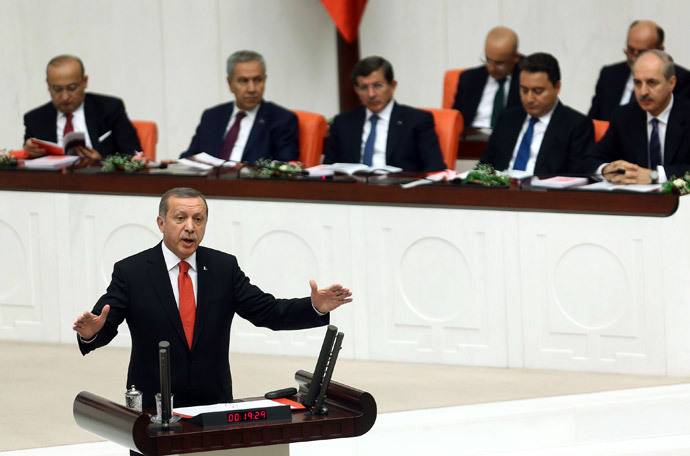
While it is true that the conflict in Syria and Iraq has now become part of the Intra-Islamic struggle, Biden's facile dismissal does not really take account of any kind of internal dynamic at work, but merely highlights US duplicity. Since then the VP has had to make a hasty telephone call to Tayyip Erdogan - his "old friend" as Biden described him during his speech - to apologize for the gaffe. In fact, well-known for his gaffes or "for putting his proverbial foot in his mouth when speaking before audiences,” Joe Biden, during a 2012 Vice Presidential debate in the then-election campaign, really split the beans completely. While he dismissed the idea of locating a "moderate middle" inside Syria's opposition as a pipedream during his recent Harvard gaffe, in sparring with Congressman Paul Ryan back in 2012, he sounded very different: "we are working hand-in-glove with the Turks, with the Jordanians, with the Saudis, and with all the people in the region, attempting to identify the people who deserve the help so that when Assad goes - and he will go - there will be a legitimate government that follows on, not an Al-Qaeda-sponsored government that follows on.” As a result, it seems that Joe Biden, apparently forgetting that the whole world watches every US presidential campaign, then disclosed the extent to which the US had been aiding and funding the armed opposition in Syria, the Jihadi opposition in Syria that is now presented as the new threat to the West.
As such, one can only conclude that Biden's recent Harvard gaffe was nothing but disingenuous. His statement that Turkey and Saudi Arabia were determined to topple Assad appears to be factual, but omits that Syria has been on America's enemy list for a long time too. Not just as part of the Bush-proclaimed Axis of Evil (29 January 2002), as elaborated by then-Undersecretary of State John R. Bolton (6 May 2002), the Damascus regime has always been regarded as a dangerous player in the region. Bashar's father and predecessor President Hafez Al-Assad was after all well-known as an implacable foe of Israel, and hence a figure loathed by the Americans, Israel's primary backers and supporters. But Biden appears to have been particularly devious in the way in which he all but betrayed Turkish President Erdogan. After all, Erdogan has apparently been nothing but a US protégé ever since the Clinton administration, and seems to have done nothing but advance the US agenda in the region over the past years. During his Harvard blunder, the VP said that "President Erdogan told me, he is an old friend, said you were right, we let too many people through, now we are trying to seal the border.” Even though Tayyip Erdogan has since declared that he never made such a statement, Turkish complicity in arming and supplying the Jihadi opposition seems well-established, as appears the fact that Turkish borders provide easy access to foreigners willing to join the good fight (or the Jihad) in Syria.
Turkey re-enters the fray
The Turkish government led by Tayyip Erdogan's Justice and Development Party (or AKP) has over the past years totally toed the American line with respect to the US-supported effort to unseat Assad. Erdogan and his cronies even tried orchestrating a number of so-called false-flag operations that would have constituted a casus belli leading to a direct Turkish military intervention - such as the 2012-attack on the Turkish border town of Akcakale, the 2013 deadly bomb blasts in the small border town of Reyhanlı, and most recently by means of an unrealized staged attack on the Tomb of Suleiman Shah, Turkey's exclave on Syrian soil. A leaked telephone conversation between the-then Foreign Minister, current Prime Minister Ahmet Davutoglu and other prominent members of the Turkish government discussing this ploy seems to have stopped Turkey from realizing the operation.
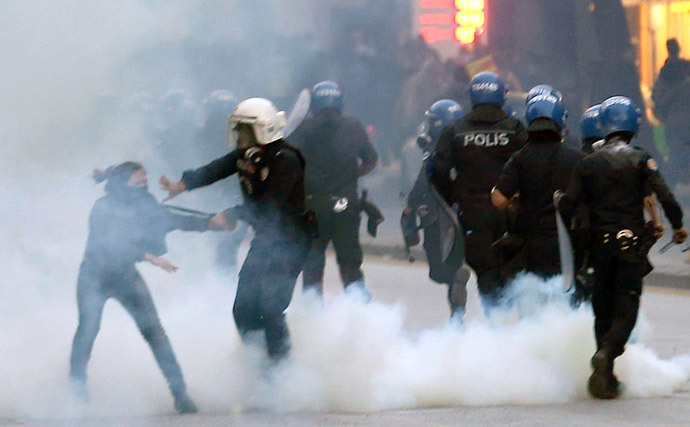
Since then Erdogan has risen to the post of President, performing an electoral switcheroo that allowed him to assign his erstwhile Chief Advisor-appointed-Foreign Minister to the top spot previously occupied by himself. And now that the Islamist academic and intellectual Ahmed Davutoglu is manning the helm of Turkey's state ship, rather than invisibly pulling strings behind the scenes, the country has clearly embarked on the final leg of its ideological journey into openly unambiguous post-Kemalist waters. In its earlier years the AKP-led government pursued a foreign policy following the "principle of 'strategic depth' and [the] much-vaunted 'zero problems policy',” both coined and developed by none other than the wily Davutoglu himself, even occasioning a rapprochement to Syria and the development of cordial personal relations between Erdogan and Assad, Jr. But in 2011, this blooming conviviality came to a grinding halt. The subsequent armed conflict in Syria has led to some two million Syrian refugees seeking shelter on Turkish soil.
The Islamic State or a Free Kurdistan: the lesser of two evils?
The now more-than-three-week IS siege of the city of Kobani, in the Kurdish enclave in Rojava, has left Turkey face-to-face with a nigh-impossible situation. US-led air strikes are targeting IS positions, in aid of PYD fighters, but the Jihadi onslaught seems to continue unabated: more than once, the city's imminent fall has been proclaimed by this or that authority. On October 2, the Turkish Parliament endorsed a measure authorizing military intervention across the Turkish borders into Iraq and Syria and permitting foreign troops to launch attacks from Turkish territory. Since then, the Turkish Army has taken up positions on the border and has been playing a waiting game.
Over the past days, this Turkish waiting game has led to numerous demonstrations and even clashes across the country as many frustrated Kurds have taken to the streets to voice their concern over Turkish military inaction: in various districts across the Istanbul metropolis (the most populous Kurdish city in the world) and in the mostly Kurdish-populated cities of Diyarbakır, Batman, Van, Sirnak, Sanlıurfa and Hakkari, with to date a death toll of 14, and the declaration of martial law across six provinces. Many Kurds also complain because the Turkish authorities are effectively preventing Syrian Kurds from returning home to fight the enemy and Turkish Kurds - identified as PKK members by the authorities - from crossing the border to assist their compatriots, carrying different passports. In the meantime, Davutoglu clarified the Turkish stance in an interview with CNN’s Christiane Amanpour. She subsequently tweeted that the “Turkish PM @Ahmet_Davutoglu tells me there can be [Turkish] boots on ground but only if the U.S. strategy includes going after al-Assad too.” As explained elsewhere, the Syrian Kurdish faction PYD (or the Kurdish Democratic Union Party) has established the enclave of Rojava just across the Turkish border.
Ubiquitous posters of the imprisoned PKK leader Abdullah Ocalan throughout Rojava vividly illustrate that the Syrian PYD is all but allied to the Turkish PKK. As a result, Turkey's government's main concern now seems to consist of containing and pacifying Kurdish unrest - domestically and across the border. As the KRG in the east now seems to moving towards outright independence (as indicated by its president Massoud Barzani over the past summer months), defending another quasi-independent Kurdish enclave on its borders is probably not in Turkey's immediate interest, and hence the Turkish Army's present engagement in a waiting game, displaying the awesome firepower at their disposal - a show of strength arguably as much directed at the PKK and PYD as at the IS.
The statements, views and opinions expressed in this column are solely those of the author and do not necessarily represent those of RT.
The statements, views and opinions expressed in this column are solely those of the author and do not necessarily represent those of RT.
